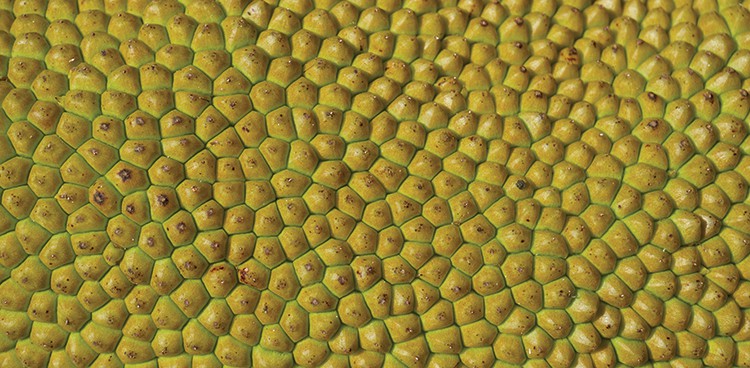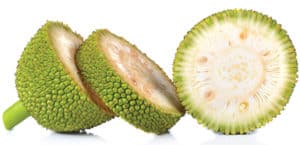
The Great 28 is featured in our Cheese+ 2017 issue. Check out 27 other pairings here.
Like lots of tropical produce, the jackfruit has an otherworldly appearance. Bulbous and often irregularly shaped, with a rind full of rubbery points like a pet’s chew toy, a single jackfruit can weigh anywhere from 10 to 110 pounds. Inside, individual fruit sections surround 100 to 500 large seeds, which are also edible once cooked.
Botanists aren’t sure about jackfruit’s origin, but they suspect it’s indigenous to India. Here’s what they do know: It’s typically abundant where elevation is low, humidity and heat are high, rainfall is heavy, and soil has excellent drainage. Thailand, Malaysia, Burma, and Vietnam prize jackfruit, raw or cooked, and its popularity has spread to places with similar climates including parts of Africa, the East and West Indies, the Philippines, Indonesia, Brazil, Hawaii, and Florida. Jackfruit is related to figs, mulberries, and breadfruit, but can be more difficult to cut and manage because of the high latex content in the rind and between arils; the sticky substance gets every-where. But don’t let that stop you from tasting it (some say its flavor resembles Juicy Fruit gum)—or pairing it with cheese.
Fresh Jackfruit

Photo Credit: MRS. Siwaporn/Shutterstock.com
Similar to some wedges and wheels, ripe jackfruit smells more pungent than it tastes. For an island breakfast, plate fresh jackfruit with Sartori Espresso BellaVitano; the Italian espresso rub on this rich cheddar-parmesan hybrid boosts the sweet notes in both cheese and fruit. If you prefer curds with an apéritif, try Langres, a cow’s milk round washed in brine and roucou, a natural colorant derived from a tropical shrub. Langres hails from the same region as Champagne, so mix up a jackfruit mimosa to go with it, or—even better—pour a splash into the inviting dimple atop the wheel before digging in (it’s designed just for that purpose).
Recommended Pairings
Sartori Espresso BellaVitano Reserve + fresh jackfruit
Langres PDO + fresh jackfruit
Cooked Jackfruit
In Asian countries, unripe jackfruit has long been a culinary staple (look for a green rind). When stewed, the white flesh shreds, taking on the consistency of slow-cooked chicken or pork. Although it doesn’t contain much protein (2.8 grams per serving), the fruit offers dietary fiber, vitamins and minerals—plusit’s nearly fat-free and low in calories. If you’re vegetarian (or an enterprising omnivore), try this meat substitute with curds. Magnasco Queso Proveleta is a semi-hard provolone from Argentina that’s traditionally grilled and splashed with chile oil or another dressing—make a jackfruit “cheesesteak” with charred onions and peppers.
Or go right to an herb-coated, salt-brined cheese such as Austrian Krauterschatz by Alma—bold aromatics provide the boost that plain, cooked jackfruit needs, as its flavor can be somewhat bland.
Recommended Pairings
Magnasco Queso Provoleta + cooked jackfruit
Alma Krauterschatz + cooked jackfruit
Boiled Jackfruit Seeds
A common snack in Asia, cooked jackfruit seeds are beginning to catch on elsewhere. Most often, they’re boiled, though sometimes they’re roasted like chestnuts then peeled and salted. Both flavor and texture are reminiscent of sweet potato and taro root.
Some ambitious chefs go a step further, stir-frying jackfruit seeds with curry or other seasonings. It makes sense, then, to pair plain seeds with spiced cheeses such as Marieke Gouda with Foenegreek—curry-like fenugreek meshes extremely well with the sweet earthiness of the jackfruit seeds. Similarly, Snowdonia Cheese Company in North Wales crafts rich cheddar imbued with zippy ginger that provides excellent contrast to the mild seeds.
Recommended Pairings
Marieke Gouda Foenegreek + boiled jackfruit seeds
Snowdonia Cheese Company Ginger Spice + boiled jackfruit seeds
Feature Photo Credit: Wassana Wiratha/Shutterstock.com



